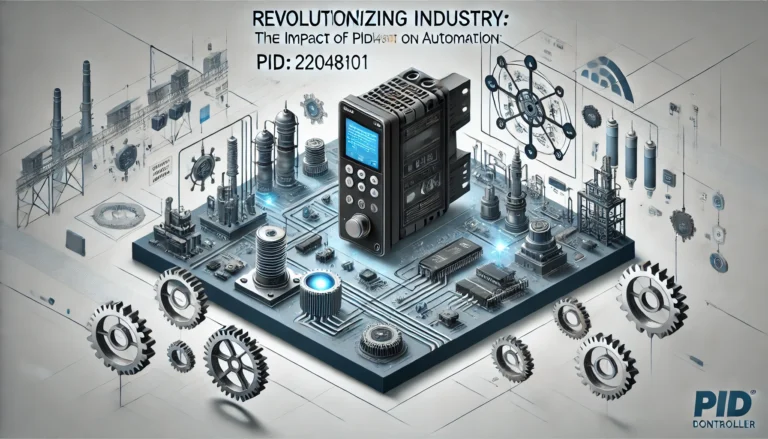In the ever-evolving landscape of industrial automation, maintaining precise control over complex processes is paramount. The PID:22048101 controller stands out as a beacon of efficiency and precision in this high-stakes field. This article delves into the functionalities, applications, and future trends of this advanced PID controller, providing insights into how it shapes operations across various sectors.
The Core Functionality of PID:22048101
PID:22048101 is a model of Proportional-Integral-Derivative (PID) controllers, which are crucial for regulating the operational parameters in industrial processes. This model offers enhanced precision in controlling temperature, pressure, and flow, which are vital for the quality and safety of manufacturing processes. With its robust design, PID:22048101 ensures that processes reach their desired set points and maintain stability, even when external disturbances occur.
Applications Across Industries
The versatility of PID:22048101 extends across a myriad of industries. In the manufacturing sector, it ensures that machines operate within precise parameters, thus guaranteeing product quality and reducing material waste. The pharmaceutical industry relies on PID:22048101 to maintain strict environmental conditions essential for drug production, where even slight deviations can lead to significant losses.
Integration with Emerging Technologies
As industries push towards digital transformation, PID:22048101 remains at the forefront by integrating with cutting-edge technologies like the Internet of Things (IoT) and artificial intelligence (AI). These integrations allow for smarter control systems that can predict and adapt to changes, enhancing operational efficiency. Real-time data analytics powered by cloud computing further empower businesses to make informed decisions quickly, reducing downtime and optimizing performance.
Sustainability Through Advanced Control
PID:22048101 not only boosts operational efficiency but also plays a crucial role in promoting sustainability. By improving energy efficiency and reducing resource waste, it helps companies achieve their environmental goals. This aligns with global efforts to mitigate climate change, making PID:22048101 a key player in sustainable industrial practices.
Future Trends and Innovations
The future of PID:22048101 looks promising with continuous advancements in sensor technology, data analytics, and machine learning. These innovations are expected to enhance the controller’s functionality, making it even more integral to industrial automation. The ongoing development in AI and IoT is likely to introduce new capabilities, such as predictive maintenance and enhanced adaptive control, which could redefine process optimization.
Enhancing Process Accuracy with PID:22048101
PID:22048101’s advanced features significantly contribute to its ability to maintain high accuracy in various industrial applications. Its precise control mechanisms allow for fine-tuning of operational parameters, which is essential in industries where even minor discrepancies can have large-scale impacts.
Tailoring Operations with Customizable Features
One of the standout attributes of PID:22048101 is its customizable nature. Users can modify settings to suit specific industry requirements, which increases its utility across different sectors. This adaptability not only ensures that it meets diverse operational needs but also makes it a cost-effective solution for businesses looking to invest in long-term process control technologies.
The Role of PID:22048101 in Quality Assurance
In sectors like pharmaceuticals and food production, where quality assurance is critical, PID:22048101 ensures that processes are consistent and comply with strict regulatory standards. By maintaining precise control over critical variables, PID:22048101 helps facilities avoid costly errors and product recalls, ensuring consumer safety and trust.
Real-World Impact of PID:22048101
The practical applications of PID:22048101 are numerous, each demonstrating the controller’s impact on operational efficiency and effectiveness. For instance, in food processing, maintaining a consistent temperature during production can influence the quality and shelf-life of products. PID:22048101 regulates these temperatures with precision, ensuring that each product batch meets the highest quality standards.
Case Studies Demonstrating Effectiveness
Several case studies highlight the effectiveness of PID:22048101 in real-world settings. For example, a chemical manufacturing company utilized PID:22048101 to optimize their compound mixing processes, resulting in a 20% increase in production efficiency and a significant reduction in waste materials. Another case involved a paper manufacturing plant where PID:22048101 helped to stabilize moisture content, which is crucial for the durability and quality of paper products.
Continuous Innovation and User Support
The developers of PID:22048101 continuously seek feedback from end users to drive improvements and innovations. This proactive approach ensures the controller evolves to meet the changing demands of industries it serves. Furthermore, comprehensive user support, including training and troubleshooting, enhances user experience and maximizes the utility of PID:22048101 in complex industrial environments.
Conclusion
The PID:22048101 controller is more than just a component in the industrial automation landscape; it is a pivotal tool that drives precision, efficiency, and innovation across multiple sectors. As industries continue to evolve towards more integrated and intelligent systems, the role of advanced controllers like PID:22048101 will become increasingly crucial. Embracing these technologies not only supports operational goals but also fosters sustainability and growth in a competitive global market.
FAQs About PID:22048101
- What is PID:22048101 and why is it important?
- PID:22048101 is a specialized PID controller used in industrial automation to ensure precise control of variables like temperature and pressure, crucial for maintaining process quality and efficiency.
- How does PID:22048101 contribute to sustainability?
- By optimizing process control, PID:22048101 reduces energy consumption and minimizes waste, supporting sustainability in industrial operations.
- Can PID:22048101 integrate with other technologies?
- Yes, PID:22048101 can integrate with IoT, AI, and cloud computing platforms, enhancing its data processing and operational responsiveness.
- What industries benefit most from PID:22048101?
- Industries such as manufacturing, pharmaceuticals, chemical processing, and food production benefit greatly from the precise control offered by PID:22048101.
- What are the future trends for PID controllers like PID:22048101?
- Future trends include the integration of advanced AI algorithms for predictive control and enhanced connectivity with IoT devices, leading to smarter and more efficient process management.


3 Comments
Hi there to all, for the reason that I am genuinely keen of reading this website’s post to be updated on a regular basis. It carries pleasant stuff.
Very well presented. Every quote was awesome and thanks for sharing the content. Keep sharing and keep motivating others.
I am truly thankful to the owner of this web site who has shared this fantastic piece of writing at at this place.